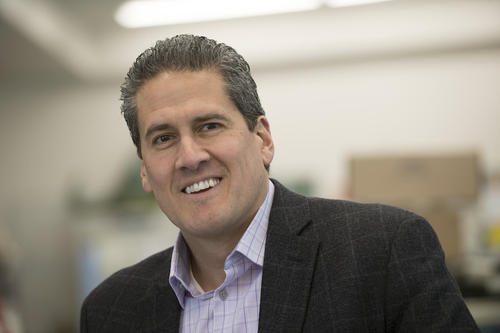|
A longtime friend of David Largaespada, Ph.D., the associate director for Basic Sciences at the Masonic Cancer Center, has made a $1.4 million donation to revolutionize cancer research in the Largaespada Lab at the Masonic Cancer Center, University of Minnesota. This gift from Michael Allen, a Lakeville resident and University of Minnesota graduate, will allow for Dr. Largaespada and his team to advance their research efforts and create new technologies to make their shared goal of ending cancer a reality.
“I've had the privilege of knowing David since we were both 16 years old, when we attended the same high school and, eventually, the University of Minnesota,” said Allen. “When my mom died of cancer in 2000, I made a goal to donate over $1 million to cancer research. Twenty years later, after so many sacrifices, here we are. I want to remember my mom before cancer. She gave to everyone, including her family, friends and the community of Prior Lake. Cancer stole all of that from her and us. That's why I made this donation. Together we can put a stop to this.”
A large portion of the gift will go to developing a new CRISPR-related technology to make a molecular machine that can find and "read" a predetermined sequence of DNA in living cells and then execute some function if that sequence is present. This technology will be useful as a basic research tool and will enable potential new therapies in which dormant cancer cells, or cells latently infected with a virus, could be sought out and killed in the body. This revolutionary idea uses the DNA sequence itself as the target of therapy, rather than the protein products that the sequence produces.
“I am so thankful that Michael believes in the work that we do and wants to share his good fortune — which came from his hard work and dedication to eradicate cancer — with us to push medical and scientific advancements to the next level,” noted Dr. Largaespada, who is also a professor in the Department of Pediatrics at the University of Minnesota Medical School. “Our research is near and dear to his heart. Michael’s hope is that no son, daughter, father, brother or sister should have to endure the horror, erosion and heartbreak, both mentally and physically, of having their loved one destroyed by cancer. Our goal is to make that a reality.”
Dr. Largaespada will also collaborate with Emily Greengard, M.D., an assistant professor in the Department of Pediatrics, to fill the need for more high-risk neuroblastoma research. Hitting close to home, the son of a family friend to Dr. Largaespada was treated by Dr. Greengard.
“We still don't understand why some neuroblastoma cases behave aggressively, and can't be cured. We've found a new driver of aggressive neuroblastoma and are working to understand this driver and target it with new drugs,” said Dr. Largaespada
Dr. Largaespada’s lab will also use the funds for detailed genetic and genomic studies to gain insight into the molecular pathways cancer cells take in the late stages of cancer evolution; namely, how they develop therapy resistance and metastatic capacity. Dr. Largaespada will also use a portion of the gift to elevate the lab's cancer prevention efforts, specifically to explore the creation of a vaccine that could be used to prevent tumors from forming in people at high risk of cancer.
“My donation was a goal that I made simple sacrifices for, because I know that it takes monetary donations to find a cure and better treatments for cancer,” noted Allen. “Donations of any amount to Professor Largaespada's lab will help make cancer a disease of the past, and that's a future worth supporting.”
The Michael Allen Fund in memory of Darlene Allen
- 30 -
About the Masonic Cancer Center, University of Minnesota
The Masonic Cancer Center, University of Minnesota, is the Twin Cities’ only Comprehensive Cancer Center, designated ‘Outstanding’ by the National Cancer Institute. As Minnesota’s Cancer Center, we have served the entire state for more than 25 years. Our researchers, educators, and care providers have worked to discover the causes, prevention, detection, and treatment of cancer and cancer-related diseases. Learn more at cancer.umn.edu.
About the University of Minnesota Medical School
The University of Minnesota Medical School is at the forefront of learning and discovery, transforming medical care and educating the next generation of physicians. Our graduates and faculty produce high-impact biomedical research and advance the practice of medicine. Learn how the University of Minnesota is innovating all aspects of medicine by visiting www.med.umn.edu.
|

